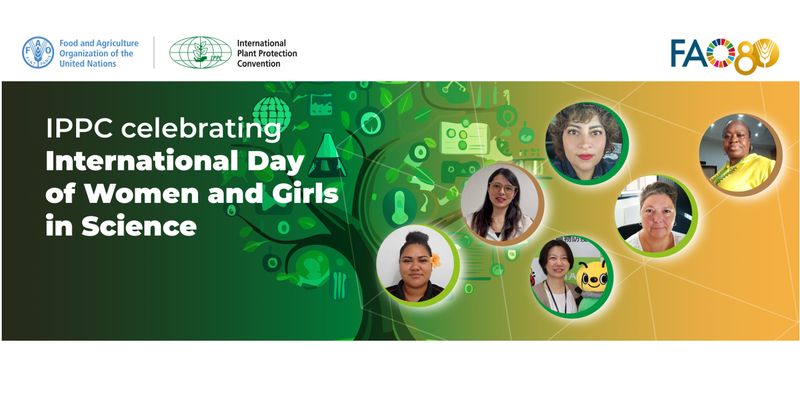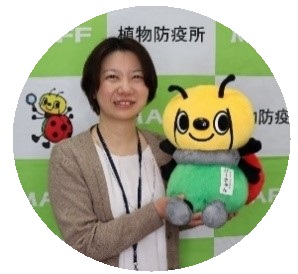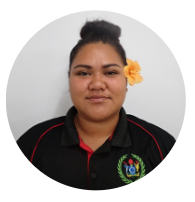Celebrating the International Day of Women and Girls in Science: New course to boost capacity development for phytosanitary excellence
Posted on Tue, 11 Feb 2025, 11:38

11 February 2025, Rome. Celebrating the International Day of Women and Girls in Science on 11 February, the International Plant Protection Convention (IPPC) and the Food and Agriculture Organization of the United Nations (FAO) elearning Academy, have launched a new certified e-learning course Working with a national plant protection organization (NPPO). Developed with core financial support from the European Union, the new e-learning course aims to strengthen the knowledge, skills, and competencies of plant health professionals working within NPPOs, enhancing their understanding of an NPPO’s goals, objectives, operations, and staff roles. NPPOs perform various functions aimed at preventing the introduction and spread of plant pests, such as issuing phytosanitary certificates and conducting pest surveillance. Therefore, ensuring that their staff are well-informed and skilled is essential for their success.
Empowering women in Plant Health
Women comprise one third of the global scientific community and hold important positions within NPPOs. Committed to continuous and inclusive capacity development, the IPPC develops high standard learning resources such as e-learning courses developed by international experts, designed to meet the diverse needs and backgrounds of professionals worldwide, including women, particularly in developing countries.
The new course includes two interactive lessons, each lasting 35-40 minutes. The first lesson provides an overview of why NPPOs are established, their main functions, objectives and key stakeholders. The second examines the roles and activities of various professionals within an NPPO. The course also includes several short videos on how NPPO professional profiles interact with each other to fulfill the NPPO’s strategic functions and objectives.
Upon completion, learners can take a final certification test to verify their acquired skills and competencies. Achieving a score of 75 percent or higher earns one a digital badge, shareable on social media or on their resume.
Expanding access and breaking barriers
The course will facilitate onboarding for new NPPO staff and empower NPPO stakeholders, including government departments, regulatory agencies, partner organizations, producers, importers, exporters, and the public. Like other IPPC phytosanitary capacity development resources, the course is free, available online anytime, accessible from anywhere, and learning is self-paced.
To help break systemic barriers preventing women from advancing in science, IPPC ensures its courses are adaptable—allowing women to learn at their own pace, anytime, anywhere. Some courses are also available in French and Spanish, broadening access.
“I am optimistic that the new e-learning course on Working with a national plant protection organization will encourage on-the-job training within NPPOs, promote the important role of NPPOs and support women's empowerment and career development in the phytosanitary field”, said Sarah Brunel, Office-in-charge for day-to-day matters at the IPPC Secretariat.
The new IPPC e-learning course was developed with technical input from the IPPC Secretariat; the Canadian Food Inspection Agency; University of the West Indies, Trinidad and Tobago; the International Center for Advanced Mediterranean Agronomic Studies, Italy; National Service for Agri-Food Health and Quality, Argentina; Zimbabwe Ministry of Lands, Agriculture, Fisheries, Water and Rural Development; Rwanda Inspectorate, Competition and Consumer Protection Authority; Kenyatta University, Kenya and COLEAD.
“This is another perfect example of excellent collaboration among several partner institutions to strengthen knowledge-sharing and competencies in plant protection”, said Christina Petracchi, Head of the FAO elearning Academy. “However, of all the learners who have taken the IPPC e-learning courses hosted by the FAO elearning Academy, 35 percent are females and 65 percent are males. We are striving to increase the national uptake and use of female professionals, worldwide", she added.
Highlighting the importance of promoting gender equity within the plant health community, Brunel and Petracchi encourage more female scientists to take the courses to boost their technical capabilities and advance to more prominent roles within NPPOs. Upcoming courses, which will be available in the forthcoming IPPC Plant Health Campus together with all other implementation and capacity development materials, include National plant protection organization learning pathways; Conducting a phytosanitary capacity evaluation; and Mobilizing resources for plant health.
Voices and views of women shaping the future of plant health
From supporting innovations in pest surveillance, protecting frontiers as plant quarantine officers, influencing plant health governance and science policy decision-making and mentoring other scientists, women are indispensable to the plant health community. Here’s what female scientists had to say about their work, the new course, and the importance of capacity development.
 | Géraldine Anthoine Deputy Head of the Plant Health Laboratory, French Agency for Food, Environmental and Occupational Health & Safety (Anses) The IPPC’s capacity development resources, protocols, and standards are invaluable in the context of greatly intensified trade and the associated risks to plant health. Capacity development enhances knowledge and management of plant health issues. However, access to online resources, knowledge-sharing, training, and initiatives to strengthen networks are challenges in the phytosanitary community. The position of women in the phytosanitary community is paradoxical. Although biology has the most females compared to other science disciplines, there are still very few women in positions of responsibility. The IPPC's capacity development resources, support women’s professional growth thus making their contribution to plant health more visible, enhancing their commitment, and encouraging more to enter the field. |
 | Tamami Shukuya Senior Plant Quarantine Officer Section of Export Quarantine Yokohama Plant Protection Station Ministry of Agriculture, Forestry and Fisheries of Japan Enhancing the technical skills of plant quarantine officers in export inspection will ensure prompt and accurate verification of exported plants, and guarantee meeting the importing country’s requirements, thereby facilitating smoother trade. Although many female plant quarantine officers in Japan are already actively working, social and environmental factors limit their training opportunities. By diversifying training formats and actively promoting on-the-job training, we need to increase opportunities for skill acquisition for female officers. |
 | Nancy Villegas Jiménez Pest Risk International Assessor, International Regional Organization for Plant and Animal Health (OIRSA) Interdisciplinary and cross-disciplinary capacity development are critical in assessing pest and disease threats, as informed and knowledgeable professionals achieve better results. It is therefore critical that knowledge reaches where it needs to go, in an accessible manner and with the right instruction. Training should be accessible, practical, and multidisciplinary, integrating expertise from agriculture, environment, and health sectors, while addressing the diverse learning needs of women, youth, and other key stakeholders to foster greater participation and impact. |
 | Zinha Adriano da Costa Correia Head of Department of Entomology Directorate of Plant Protection Services Ministry of Agriculture and Rural Development, Guinea-Bissau To reduce the impact of plant pests and diseases on crops and guarantee incomes and food security, it is necessary to study these pests and advise producers and governments appropriately. The IPPC’s Africa Phytosanitary Programme has introduced us to new monitoring, diagnosis, data collection, and identification techniques. Additionally, the existing and upcoming IPPC eLearning courses support with management of pests of crops with economic importance and encourage continuous and inclusive training of plant health professionals- phytosanitary officers, plant health technicians, extension workers and agricultural producers. |
 | Isabel Cristina Calle Balbin Contractor, Analyst of the Plant Health Diagnostics Laboratory, Instituto Colombiano Agropecuario (ICA), Colombia Monitoring and prevention of plant diseases is an essential, yet challenging task, that requires significant investment from countries. Many countries in Latin America still lack well-equipped laboratories for diagnosis, appropriate technology and trained personnel to strengthen plant pest monitoring. It is also crucial to establish and adopt standardized diagnostic protocols, accessible to countries in the region and based on best international practices while being adapted to local conditions, for consistent and reliable results. |
 | Heiarii Tia-Marie Syme Senior Biosecurity Officer - Plant Biosecurity Division, Ministry of Agriculture, Cook Islands As our country and the world evolves, so must our capacity to deal with new diseases and pests. It is no longer “business as usual”! Our changing climate is introducing new pests and diseases, and with an increase in trade both in the international and regional markets, disease and pests know no borders. We must be willing and ready to take on new phytosanitary initiatives and remain vigilant to safeguard our borders from new and invasive incursions. To enhance phytosanitary capacity, particularly for female plant health officers, we should increase information-sharing sessions, celebrate and recognize women’s contributions, encourage mentorship for early-career female scientists, invest in continuous education and offer more professional development opportunities. |
As the world faces increasing plant health challenges, fostering inclusive capacity development remains essential. The IPPC Secretariat continues to champion equal opportunities, ensuring that women and men alike can advance and contribute to phytosanitary excellence.

